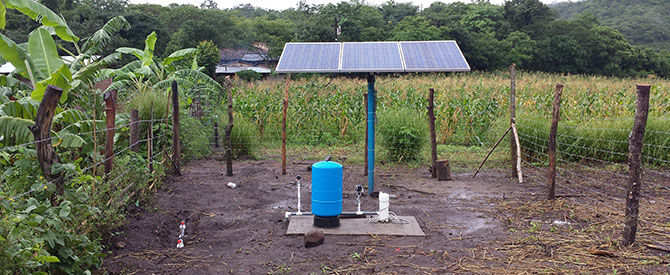Down a one-lane, dirt road in Estelí, Nicaragua, lies the remote village of Sabana Grande. Although it lacks running water, the community has existed for hundreds of years and relies on agriculture as its main source of income. With more than 140 members, 30 households, and one elementary school, the community used to depend on two water wells. Both a half mile walk, children and women were responsible for the daily transport of water to their homes.
Helping Sabana Grande
In 2013, as a part of the George Mason University student organization Mason Engineers for International Development (EfID), I helped lead a project in my native country to provide Sabana Grande with a new water supply and distribution system. After an assessment trip, we planned and designed a self-reliant, sustainable distribution system customized for the conditions in Sabana Grande.
In phase one of the project, we installed a 200-foot well with a submersible pump, a pressure tank, 1,500 linear feet of pipeline, and six water stations throughout the community. In order to make the system sustainable, an 800-watt solar array was set up to power the submersible pump. In phase two, we installed an additional two miles of pipeline, 30 new water stations, extended the water system to every house and the elementary school, as well as introduced an elevated, 10,000-liter storage tank. As many as 40 students and 14 professional engineers worked on this project over the span of two and a half years and raised $40,000 that went to funding it. After successfully completing the project, EfID won second place in the 2015 National Council of Examiners for Engineering and Surveying's engineering award competition.
 The 800-watt solar array that provides power to the submersible pump in Sabana Grande, Nicaragua.
The 800-watt solar array that provides power to the submersible pump in Sabana Grande, Nicaragua.
Finding Inspiration in Unexpected Places
In addition to the Sabana Grande project, I have assisted EfID with similar projects in the Andes Mountains and in other areas in Nicaragua. I've helped with the renovation of an existing and deteriorated water distribution system in an indigenous community in Peru and the installation of a septic system for a feeding center on the east coast of Nicaragua.
Currently I am working with Engineers Without Borders' (EWB) Northern Virginia Professional Chapter on a project in Honduras that will provide a water distribution system to the community of El Sauce in Villanueva, Cortés. The community has 500 members, more than 70 households, and several community centers that are in need of a water system. Our plan includes the installation of a new water well and a complete replacement of the existing low quality water lines that were fed from three natural springs that are now dry. I am looking forward to traveling to Honduras in March to begin the first steps of bringing clean water to El Sauce.
The most rewarding part of my volunteering has been experiencing the appreciativeness of the community members whose lives are improved. Being an engineer comes with a civic responsibility, which is why I think participating in organizations like EfID and EWB is so important. Since 2002, EWB (USA) members have impacted more than 2.5 million lives. I am proud to say I am a part of this global transformation.